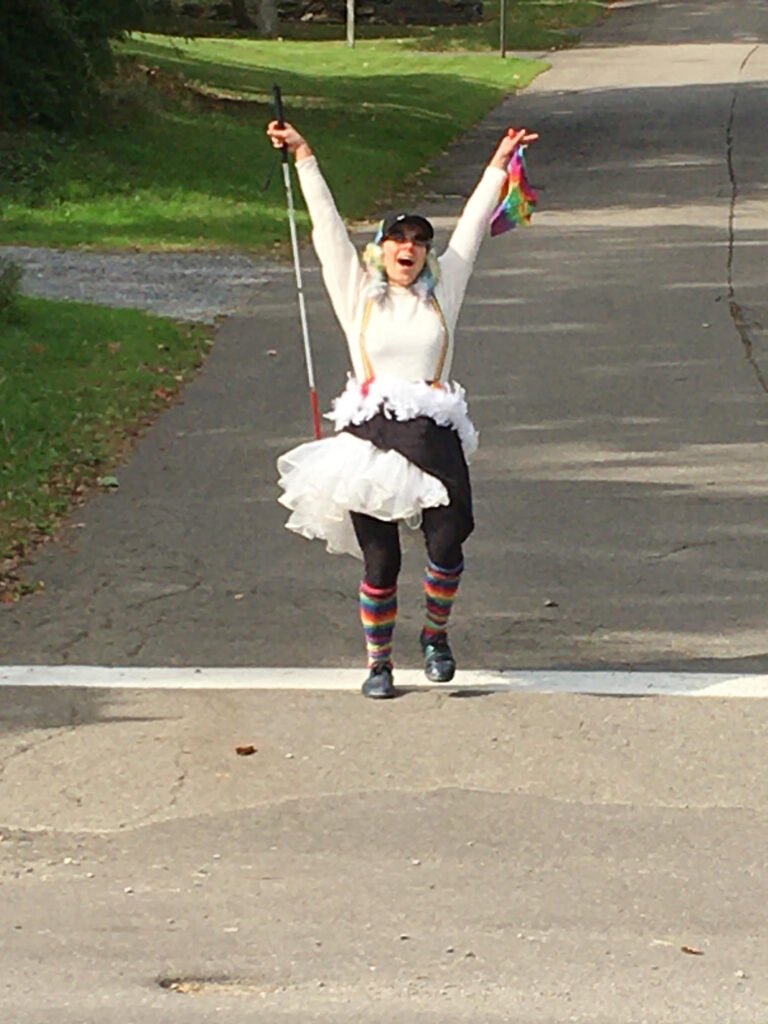Once she got a taste of adaptive climbing during the coronavirus pandemic, Amber DiGerlando was hooked.

Growing up, Amber DiGerlando participated in the usual leisure outdoor activities her sighted peers enjoyed: hiking, biking, horseback riding, to name a few. She wasn’t particularly motivated by competitive sports as much as the thrill of being outdoors and staying in shape.
That thought process has undergone a few changes for the 45-year-old DiGerlando, who lost most of her vision in her 20’s. During the coronavirus pandemic, when people were stuck indoors and craved face-to-face social interaction with family and friends, she began contemplating activities that could be done with her partner Nicole, an English professor.
Nicole, who is sighted, had previously suggested climbing. But the closest spot was over an hour and a half away. After exploring several activities including racewalking and blind tennis, DiGerlando agreed to give climbing a try.
“I wanted to do something that would be inclusive of my partner, because it’s more fun to do things with someone else,” explained DiGerlando, who was born in Pennsylvania but moved to the Pacific Northwest before settling in western New York shortly before the pandemic. “(Nicole) was like, ‘remember I told you we should do climbing? It doesn’t matter if we have to drive an hour and a half to do it’.”
Adaptive sports weren’t foreign to DiGerlando. While living in Washington State, she joined the Northwest Association of Blind Athletes (NWABA), an organization dedicated to enriching the lives of blind individuals through sports. DiGerlando first tried tandem biking with Nicole, which they enjoyed. That’s when she discovered the importance of having the support of other blind people.
“They’re the coolest organization on the planet. (Nicole and I) went tandem biking because I used to ride horses and bicycle when I was young. That’s when we found out how awesome it is to have a blind group to do recreation. They actually understand what it is to be blind and do something challenging.”

After relocating to New York, the couple soon came across Adaptive Climbing Group (ACG), an organization that creates climbing opportunities that are both accessible and affordable to individuals with disabilities. Serving over 1,000 annual participants, ACG is the largest adaptive climbing group in the United States.
Once DiGerlando got a taste of climbing, she was hooked.
“It was amazing. I really just wanted to get in shape. I’m competitive, but more like with myself than competing in events. Everybody can climb at their own level and people cheer each other on. It was just such an amazing community that I didn’t even know existed.”
Vision loss often occurs through a specific incident such as a disease or accident. For DiGerlando, it was a combination of factors. She was diagnosed with optic neuritis, a condition that causes damage to the optic nerve as a result of swelling. Doctors discovered the problem after first believing she had multiple sclerosis.
At age 22, DiGerlando was attacked and suffered blows to her head, causing a traumatic brain injury that further impeded her vision. While her attacker was never charged with a hate crime, DiGerlando believes the incident was directed at her sexual orientation. Shortly after the attack, she also suffered a severe virus while camping in Colorado.
DiGerlando’s vision has fluctuated from being legally blind to almost gone. Currently, she estimates it to be around 20/300.

“I had all these things happen at once, so it wasn’t just one thing that caused my vision loss. The optic neuritis could come back at any time and do worse damage. But right now, it’s pretty good and I’m happy.”
Climbing has become a regular part of DiGerlando’s routine. She has received enthusiastic support from Central Rock Gym (CRG), who has partnered with ACG to offer adaptive climbing on a regular basis in Rochester and Syracuse. She hopes to partner with the New York School for the Blind to offer climbing programs for blind and visually impaired youth.
“I’d like to see about getting some of the children at the school to come down for climbing. We’ve already had a few youths that heard about the program through word-of-mouth. They weren’t visually impaired but had other disabilities.”
DiGerlando first came in contact with Griffin Pinkow and the Foreseeable Future Foundation during the pandemic. She and Nicole had just moved to New York and were searching for an activity they could do together. She initially tried blind tennis, and was planning to travel to Pittsburgh for a clinic. But Nicole injured her knee and they were unable to attend.
DiGerlando then tried racewalking but had several mishaps, including nearly being hit by a car. She finally settled on adaptive climbing, and also discovered canoeing. After being accepted as a Foreseeable Future grant recipient, DiGerlando is using the funds to cover the cost of traveling to several events. One of them is the Erie Canalway Challenge, an event comprised of walking, biking and/or canoeing the 365-mile Erie Canalway Trail. The grant will also help with the cost of membership to her climbing gym.
DiGerlando hopes Para climbing will soon become a Paralympic sport. While she has yet to participate in competitions, her goal is to be ready for Nationals next year and perhaps a world cup event. At 45, she knows her window to compete as an athlete is short. Her ultimate goal is not only to get that opportunity, but to see other blind people take up the sport.
“There are a lot of people who climb, but I don’t see very many blind people climbing. It’s empowering. I would love to go on the world cup tour and meet all these cool Para athletes from other countries I see on television. But I also would like to be a part of seeing it become mainstream, that blind people have an opportunity.”
